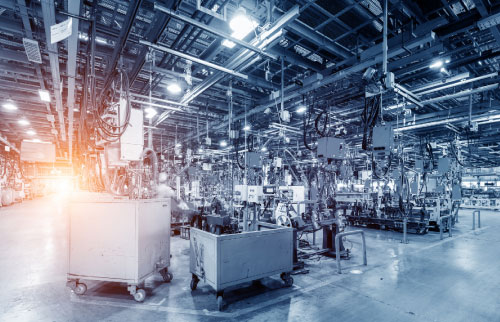How data can help manufacturing achieve net-zero

According to the Climate Change Committee's 2021 Progress Report to Parliament, the manufacturing and construction industry is the third most polluting industry in the UK and was responsible for 13% and 18% of UK greenhouse gas emissions in 2019 and 2020, respectively.
Manufacturing produces a large percentage of Britain's carbon emissions, a mix of fuel combustion (for high and low-grade heat, drying/separation, space heating and on-site electricity generation) and process emissions.
In the battle for net-zero, the UK has already made significant energy efficiency gains, specifically in the manufacturing and transport sectors, which are conventionally the two most energy-intensive sectors (Office for National Statistics, 2018). The most significant fall in energy intensity occurred in the manufacturing sector, by 42 per cent between 1990 and 2017.
A Drax study found that two-thirds of manufacturing businesses have already committed to net zero, and 68 per cent of those have a formal strategy for getting there.
But with the challenges caused by the pandemic, the manufacturing sector's progress towards net-zero has suffered too. Many companies have had to focus on stabilising operations amid supply-chain chaos, including inflationary cost pressures.
But the pandemic has also demonstrated the sector's incredible ability to adapt, with F1 and aerospace companies taking part in the NHS coronavirus ventilator challenge, gin companies producing hand sanitiser, and the Royal Mint making plastic visors. This agility will help manufacturers take their next steps towards net zero.
Manufacturers can also see the opportunity that net-zero represents for them, such as access to finance for green investments, significant benefits of reducing energy consumption, developing and exporting new products/ knowledge. These opportunities will lead to the sector being an attractive, innovative and sustainable one to work in, creating highly skilled and rewarding jobs across the country.
The manufacturing and high-tech industry will play a key role in decarbonising areas such as:
Aerospace: Ongoing R&D into alternative fuels and technologies for use in air travel, such as hybrid, electrification, and battery design.
Engineering: Embedding low-carbon design and implementation at scale, so products perform adequately by 2030.
Electronics: The data centre sector is a consistent and predictable energy user and could enable greater adoption of intermittent renewables and a more distributed grid.
Unique challenges
Manufacturers are under growing pressure from employees and customers to be more sustainable by decarbonising operations and in the wider decarbonising of the economy by designing and manufacturing the products for the low-carbon economy to work. Many have already cut down on plastic usage, switched to green energy providers, and added measurement and controls that put machines to sleep when they are not in use.
Implementing new digital technologies and techniques can increase sustainability and improve energy efficiencies within a manufacturing business. Specific types of technologies that can improve efficiency include; automation (robotics, cobotics), internet of things (IoT), virtual reality (VR), and augmented reality (AR). So what more can they do? Turn to data.
Data is often hailed as one of the most valuable resources on earth. The role data plays in helping combat climate change and cut carbon emissions cannot be underestimated. According to Drax, 85 per cent of key decision-makers in manufacturing see data analysis as a top priority for achieving net-zero.
Data is the game-changer fuelling the advanced technology needed to monitor, predict and reduce emissions. Aggregating and analysing data supports evidence-based decision making.
Companies can use their internal data (big data) to identify their strengths and weaknesses and develop an effective roadmap towards net zero. AI and machine learning can help reveal deep insights into a business's carbon footprint.
The Industrial Internet of Things (IIoT) plays an important role in this context as it acts as a key enabler for sustainable manufacturing, ensuring economic efficiency to assist in achieving environmental goals.
The main benefit of using IoT and IIoT for sustainable manufacturing is collecting exactly this data to work with it. A vertically integrated IoT solution including software, automation, and sensors to easily connect, monitor, and analyse a manufacturing process.
Once implemented, manufacturers can start to measure, compare, and analyse current input to improve output, making it more efficient - and greener. IoT-based solutions can help manufacturers optimise their entire energy system, making it more efficient and sustainable.
There is a lot of upskilling required within many manufacturing businesses to manage most of the data analysis in-house, so industry needs to seek external service providers to accelerate the uptake.
Smart manufacturing solutions will deliver sustainable production, like the economical use of valuable resources like material, energy, or water.
Many companies are already finding innovative uses for data in their net-zero initiatives. Smoothie giant Innocent is unveiling a new carbon-neutral factory in Rotterdam called ‘The Blender’. The new factory will utilise digital technology to streamline production lines, gather and analyse in-depth data on power usage, and provide new ways to monitor energy consumption, even remotely from the company's London head office.
Data analysis can drive down carbon emissions throughout the manufacturing industry, from aerospace, automotive to the consumer arena. All the data needed is already available: all it takes is the technology, systems, and processes to analyse it.
Redline Group's mission is to enable high-technology companies to build world-class teams through knowledge-led recruitment. For more information, contact Redline Group on 01582 450054 or email info@RedlineGroup.com or view our latest job opportunities, by clicking here.

